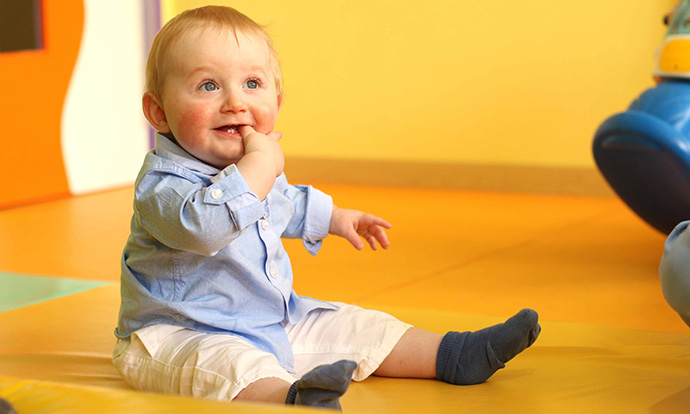Is your infant having a tough time sleeping?
Do you find yourself awake at 2:00am with your cranky little one, wondering what is the correlation between teething and sleeping?
Like with many baby conundrums, from mysterious low-grade fevers and runny noses, to weird poops or general grumpiness, it’s easy to blame teething for bursts of bad sleep. But is it really true that teething causes sleep disruptions?
First, decide if it’s her teeth.
Teething can’t explain all sleep difficulties, so consider whether she’s been showing other symptoms during the day. Indeed, some children are more irritable or run a low fever. You might be able to see, or feel with a clean finger, a new tooth budding just under the gums. She may also have found teething toys or cool things—like wet washcloths from the fridge—comforting. If she isn’t displaying any teething symptoms (and she isn’t sick) then sticking to your usual sleep routine will help her learn to sleep better in the long run.
Next, adjust your expectations.
If yes to the above, then the imminent arrival of a new tooth just might be keeping him up. Some babies might fuss over a dull ache, while others might cry or express pain. You can expect two to three days of sleep disruption as the tooth erupts, after which his sleep habits should return to normal.
Know that it’s fine to treat the pain.
If it appears teething is painful enough to interfere with your child’s sleep, try giving her Infant Tylenol or—if she’s over six months old—Infant Ibuprofen (Motrin, Advil) at bedtime. “It helps parents to feel better that the pain has been addressed,” The American Academy of Pediatrics doesn’t recommend medicated teething gels that are rubbed on gums, as they have been proven to be ineffective (baby’s drool is enough to wash them away) and can have side effects like numbing your baby’s throat and making it difficult for her to swallow.
Finally, stick (more or less) to the bedtime routine.
Your response to sleep disturbances during teething can actually start to create new sleep patterns and routines—e.g., mama comes when I call and rocks me to sleep—that aren’t ideal for building your baby’s longer-term sleep skills. If teething is keeping you both up at night, trust your instincts and find a balance in your response. If a bit of extra soothing works for the few days it takes a tooth to erupt, go for it. But be mindful that the troublesome tooth should arrive in two to three days and when it does, gently steer your baby back to his usual routine. You’ll all sleep better in the long run.
Sleep in an elevated position
When we lay flat, the blood supply runs through to our gums and they inflate, causing irritation and discomfort. Keeping them elevated will definitely relieve our little ones, just a tad bit!




